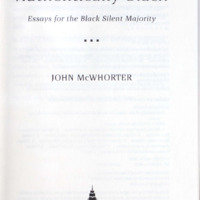-
Title
-
Authentically Black : essays for the Black silent majority
-
Description
-
In his New York Times bestseller, Losing the Race, John McWhorter, a Berkeley linguistics professor, tried to make sense of why so many African-Americans continue to define themselves by race and examined what he calls the cult of Victimology, Separatism, and Anti-Intellectualism he has witnessed on America's college campuses. In Authentically Black, McWhorter broadens his lens in this penetrating and profound collection of essays that continue his exploration of what it means to be black in America today. According to McWhorter, nearly forty years after the Civil Rights Act, African-Americans in this country still remain "a race apart." He feels that modern black Americans have internalized a tacit message: "authentically black" people stress initiative in private but cloak the race in victimhood in public in order to protect black people from an ever-looming white backlash. McWhorter terms this phenomenon the "New Double Consciousness" in homage to W. E. B. Dubois's description of a different kind of double consciousness in blacks a century ago. It is within this context that McWhorter takes us on a guided tour through the race issues dominating our current discourse: racial profiling, getting past race, the reparations movement, black stereotypes in film and television, black leadership, diversity, affirmative action, the word nigger, and Cornel West's resignation from Harvard. With his fierce intelligence and fervent eloquence, John McWhorter makes a powerful case for the advancement of true racial equality. Authentically Black is a timely and important work about issues that must be addressed by blacks and whites alike. Authentically Black is a book for Americans of every racial, social, political, and economic persuasion.
-
Identifier
-
1094414
-
1592400019
-
Creator
-
McWhorter, John H
-
Source
-
Brian Lamb Booknotes Collection
-
Gift of Brian Lamb, 2011.
-
Catalog record
-
Language
-
eng
-
Date
-
2003
-
Program air date: March 2, 2003
-
Publisher
-
Gotham Books
-
George Mason University. Libraries. Special Collections & Archives
-
Text
-
Transcription of Annotations
Front and back endpapers include some biographical information on the author's childhood, family, career, and his previous book 'Losing the race'. The author warns that whites have gone about as far as they will to bring about racial equality and that the rest is up to blacks themselves. He claims that blacks want white people to like them, don't want to appear successful to whites, and are strong at home, but act as victims in public. Other notes refer to the high number of black men in jail, racial profiling and its consequences - the adoption of victimhood as a racial identity, the cult of separation, the cult of anti-intellectualism - and the Mother Africa ideology, which is characterized as simplistic and without any historical factual basis. The author's views on Al Sharpton, Jessie Jackson, Randall Robinson, Adam Clayton Powell, John Bryant, and Eugene Rivers, and Cornel West's resignation from Harvard are also included in the notes, as are the following questions, statements and quotes: "What was 'Losing the race'? - What was its impact?" - "Could a white [person] write this book?" - "Is there a scarcity of positive portrayals on TV?" - "What do you think of the War on Drugs?" - "Affirmative action and quotas originally comes from whites." - "Is racism the only thing preventing black students from doing well in school?" - "What are two-tier admission policies?" - "We're taught to resist "becoming white"". - "What is "white guilt"?" - Annotations by Brian Lamb in the margins and underlining of pertinent phrases throughout the book. -- Examples: p. 45: "Profiling is a linchpin in what keeps us from getting past race as so many would like us to." - p. 98: "For almost forty years now, it has been considered "authentically black" in many circles to indulge in year after year of ceremonial agitprop while whites develop all of the policies - successful or not - that have attempted to improve the lot of the race." - p. 218: "The need for a positive history is more urgent for black Americans than for any other American ethnic group."
-
Subject
-
"African Americans--Social conditions--21st century."
-
"African Americans--Race identity."
-
"African Americans--Intellectual life--21st century."
-
"African Americans in popular culture."
-
"Popular culture--United States."
-
Relation
-
Original Booknotes interview
-
Rights
-
This work may be protected by copyright laws and is provided for educational and research purposes only. Any infringing use may be subject to disciplinary action and/or civil or criminal liability as provided by law. If you believe that you are the rights-holder and object to Mason’s use of this image, please contact speccoll@gmu.edu.
 1094414.pdf
1094414.pdf